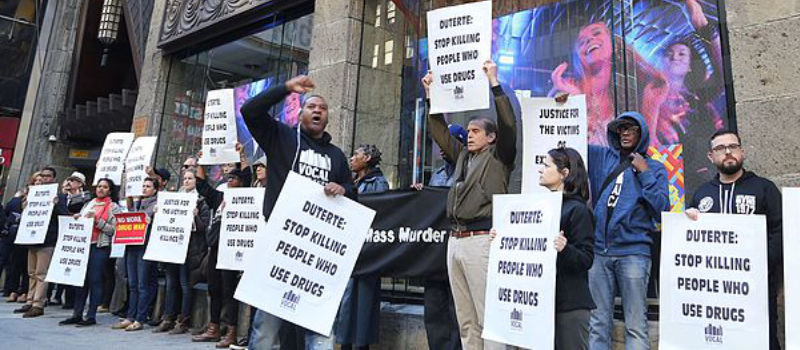Philippines’ War on Drugs: Gone Too Far?
June 26, 2019 | Expert Insights

BACKGROUND
Duterte won the 2016 Philippine presidential election on May 9th, promising to kill tens of thousands of criminals, and even going as far as urging his citizens to kill drug addicts. As mayor of Davao city, Duterte was criticised by human rights groups for the extrajudicial killings of hundreds of street children, petty criminals and drug users. These executions were carried out by the infamous ‘Davao Death Squad’, a vigilante group with which he was allegedly involved. His widespread anti-drug operation since coming to power in Manila has already killed more than 28,000, with some human rights groups reporting that the number of drug-related killings is actually over 30,000 taking unreported cases into account.
ANALYSIS
Duterte has both confirmed and denied his involvement in the alleged Davao Death Squad killings, and has benefited from a public perception that he made the city one of the world’s safest. However, police records from 2010-2015 shows that Davao had the highest murder rate and the second-highest rape rate during Duterte’s term as mayor.
Moreover, Philippine anti-narcotic officials have admitted that Duterte uses flawed and exaggerated data to support his claim that the Philippines is becoming a ‘narco-State’. The Philippines has a low prevalence of drug users compared to the global average, as per UNODC statistics. In addition, Duterte has shown no signs whatsoever of opening investigations into any of the summary executions, vowing to protect cops who killed drug suspects. His cabinet’s stance has been that the issue is being blown out of proportion. To this end, Duterte is once again using misrepresented data to prove that the number of deaths are not actually as much as the international community perceives them to be. Since there have been no trials, there remains no evidence that the people being murdered are indeed drug dealers or drug addicts.
COUNTERFACTUAL
Despite the multitude of atrocities and horrors associated with this war on drugs, rehabilitation remains a greatly under-appreciated component. Davao will soon have its second rehabilitation centre for drug users and pushers that surrendered. The health department has announced that eleven more such centres are scheduled for completion later this year. This drug rehabilitation has also renewed Phillipine-China cooperation, with China helping to build the three largest centres.
Despite the negative publicity, 2017 and 2018 opinion polls showed a high level of public support for the drug war. Colombia, Mexico, the Dominican Republic and Indonesia have expressed interest in replicating the Philippines’ ‘knock and plead’ strategy of convincing drug users and pushers to cease their activities and to check into the rehabilitation and reform centres.
ASSESSMENT
Our assessment is that there definitely exists an element of structural injustice in the Philippines, which is intrinsic and shows no signs of abating. As long as the vast majority of his citizens support his aggressive methods and strong words, we feel that there is little that can be done in the present to make Duterte accountable.
The Philippines’ high index of dispensation indicates that the country is going through one of its most decisive moments, with the crackdown on drug-related crimes now higher than ever before. Moreover, we believe that the Philippines has problems in addressing both the structural and functional dimensions of immunity, which indicates that the country does not have the capacity needed to deliver equitable justice and security. Our opinion is that despite all the international scrutiny, the President’s seemingly unjust actions are merely part of the Philippines’ deeply entrenched culture of absolution. His manoeuvres remind those of the country’s prior infamous dictator Ferdinand Marcos, a personality much respected by Duterte.
Read More:








Comments